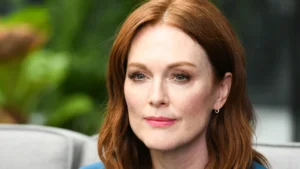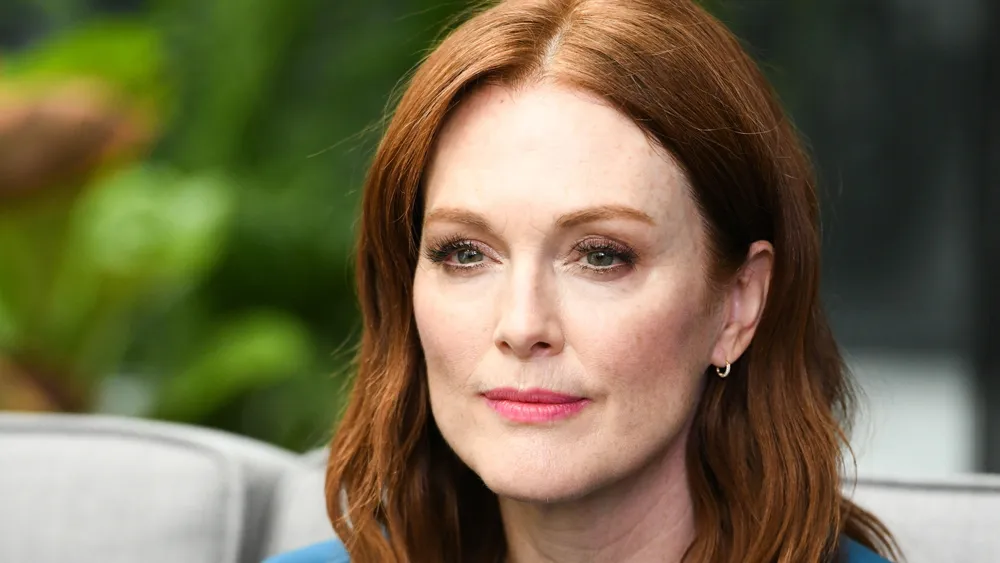How Julianne Moore Got into Acting

Julianne Moore is a critically acclaimed actress known for her versatility, emotional depth, and natural ability to embody a range of characters. From dramatic roles in films like Still Alice to more lighthearted performances in The Big Lebowski, Moore has proven her range time and time again. But her journey to Hollywood stardom was not one of overnight success. In fact, her path to becoming one of the most respected actresses in the industry was shaped by dedication, training, and an early love of performance.
In this article, we’ll explore how Julianne Moore got into acting, her early experiences, and the lessons she learned along the way.
1. A Passion for Performance from an Early Age
Julianne Moore’s love for acting began at a young age. Born on December 3, 1960, in Fayetteville, North Carolina, Moore was raised in a military family. Her father, a military judge, and her mother, a psychiatric social worker, relocated frequently during Moore’s childhood, which gave her a unique perspective on adapting to new environments.
Despite the constant moving, Moore found solace in performing arts. In an interview with The New York Times, she shared, “I was always kind of the new kid, and I think acting was my way of trying to fit in. I found a kind of acceptance in pretending to be other people.” This early attraction to performance and acting allowed Moore to develop a deep interest in drama.
Her early passion for acting became clearer when she began participating in school plays. Moore found that acting provided an outlet for creativity, and it also gave her a sense of control in an ever-changing environment. “When you’re an army brat, you’re always a stranger,” Moore once explained in a Vanity Fair interview. “Acting was my way of finding a home.”
2. Education and Formal Training
Moore’s path to acting was further solidified when she decided to pursue formal education in theater. After graduating from high school in 1979, Moore attended Boston University where she studied acting at the prestigious College of Fine Arts. During her college years, Moore’s talent for embodying different characters began to flourish.
At Boston University, Moore studied under some respected acting coaches, which allowed her to hone her craft. “I was just working all the time, just trying to figure out how to do it better,” Moore said in an interview with The Guardian. She immersed herself in the world of theater and the art of performance, learning the tools of the trade that would later help her in her transition to film.
Upon graduating with a Bachelor of Fine Arts degree in 1983, Moore decided to take her talents to New York City, where she began auditioning for theater productions.
3. Getting Her Break in Television
Julianne Moore’s early career was spent largely in the world of television. She made her television debut in 1985 with a role in the soap opera The Edge of Night. Moore worked on this soap for several years, which provided her with valuable screen experience and helped her develop her craft.
Though her time on soap operas helped her gain recognition, it was her performance in the 1990 miniseries The Last to Know that really caught the attention of casting directors in Hollywood. But Moore’s transition from television to film didn’t happen immediately. In fact, it was a gradual process, as she appeared in a series of smaller, supporting roles in films during the early 1990s.
4. Breakthrough Roles in Film
Julianne Moore’s big break in film came in 1992 with her role in Short Cuts, directed by Robert Altman. The ensemble cast included some of the most talented actors in Hollywood at the time, and Moore’s performance stood out as a highlight. The film was a critical success, and Moore’s nuanced portrayal of a troubled housewife showcased her ability to dive deep into complex, multifaceted characters.
Speaking about her experience working with Altman, Moore said, “Robert Altman had this amazing way of encouraging you to take risks, to bring yourself into the work. It was really liberating.” This experience marked a turning point in Moore’s career, as it opened the door to more diverse and challenging roles in Hollywood.
In the years that followed, Moore’s career soared as she took on prominent roles in films such as Safe (1995), Boogie Nights (1997), and Magnolia (1999). In Boogie Nights, Moore’s portrayal of Amber Waves, a former porn star struggling with motherhood, earned her widespread acclaim and an Academy Award nomination for Best Supporting Actress.
5. The Transition to Leading Roles
By the early 2000s, Julianne Moore had established herself as one of the most respected actresses of her generation. She transitioned from supporting roles to leading roles, and her performances continued to garner critical acclaim. Her portrayal of a woman grappling with early-onset Alzheimer’s disease in Still Alice (2014) earned her an Academy Award for Best Actress, solidifying her status as one of Hollywood’s finest talents.
Moore’s ability to bring emotional depth and complexity to her characters is one of the key reasons she is regarded as one of the best actresses of her time. As she reflected in an interview with The Hollywood Reporter, “I’m interested in the complexity of human behavior. I love the opportunity to explore different sides of a person—who they are, who they want to be, and the complexities of their lives. That’s what keeps it interesting for me.”
6. The Importance of Persistence and Passion
Julianne Moore’s journey to becoming a world-renowned actress wasn’t easy, but her persistence and passion for the craft kept her moving forward. She faced rejections and challenges early in her career, but her love for acting and commitment to improving her skills kept her going.
“I think what I’ve learned over the years is that you have to keep going, even when you feel like you’re not getting anywhere,” Moore said in an interview with Variety. “There will be setbacks, there will be hard times, but you have to trust that persistence will get you through.”
Moore’s story is a testament to the power of hard work, dedication, and passion in the pursuit of a dream. She was able to navigate the challenges of the acting world and build a career based on her immense talent and determination.
7. Conclusion
Julianne Moore’s rise to fame was no accident. She worked tirelessly to develop her craft and pursued her passion for acting with focus and dedication. From her early days in television to her breakthrough roles in film, Moore’s journey was shaped by her commitment to being a versatile and authentic actress. Today, she stands as a role model for aspiring actors, having built a career that spans decades and includes some of the most iconic performances in recent cinema.
Her advice to aspiring actors is simple yet powerful: “You have to trust in the work, trust in your ability to do it, and always stay curious about the world around you. That’s what keeps it alive for me.” Julianne Moore’s career proves that with the right combination of skill, persistence, and passion, anyone can make their mark in the world of acting.




